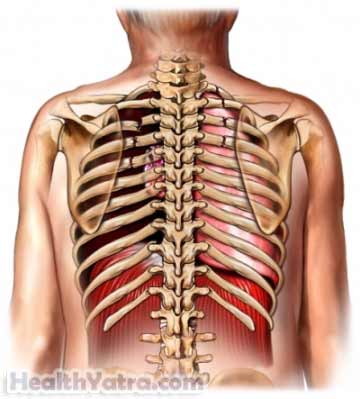Definition
A rib fracture is a break in a rib bone. Bruised muscles and ligaments often happen with a rib fracture. With a rib fracture, the lungs and other organs can be injured. More than one rib fracture after a trauma can indicate serious internal injury.

Causes
Rib fractures are caused by:
- A direct blow to the rib
- Crushing of the chest, such as in contact sports or a car accident
- Severe coughing incidents that can occur with lung problems or at high altitude
- Rib fractures in young children are often a sign of abuse
Risk Factors
A risk factor is something that increases your chance of having an injury. Risk factors for breaking a rib include:
- Age: 65 years and older
- Difficulty doing activities of daily living
- Playing contact sports
- Having weak bones
- Having a chronic cough
- Extreme repetitive upper body activity (less common), such as in:
- Throwing athletes
- Basketball players
- Golfers
- Rowers
- Weight lifters
- Having an occupation involving a lot of overhead lifting
- Having a history of rib or chest fracture
Symptoms
Symptoms include:
- Pain in the ribs or upper chest area
- Pain when coughing
- Swelling and bruising in the fracture area
- Severe local tenderness in the fracture area
- Internal bleeding
- Pain while breathing
Diagnosis
The doctor will ask about your symptoms and how the injury occurred. He will examine your chest, lungs, and back.
Tests may include:
- Chest x-ray—an x-ray of the chest to check for fractures and any lung damage
- CT scan—a type of x-ray that uses a computer to make pictures of structures inside the chest
- MRI scan—a test that uses a strong magnetic field and radio waves to make pictures of structures inside the chest
Treatment
Treatment includes:
Rest
Rest and do not do physical activity until the pain has gone away.
Protection
Your doctor may suggest wearing a chest binder around your ribs to protect them. The binder will also help you breathe properly. It is very important to take some good breaths so that the lungs remain clear. Pneumonia can develop after rib fractures if you are not breathing deeply enough. If you play contact sports, you may need to wear a rib cage protector for 6-8 weeks when you return to playing.
Medication
Your doctor may recommend that you take one of the following drugs to help reduce inflammation and pain:
- Ibuprofen (Motrin, Advil)
- Naproxen (Aleve, Naprosyn)
- Acetaminophen (Tylenol)
- Aspirin
Physical Therapy
As your ribs heal, a physical therapist can teach you breathing exercises. The therapist can also help you maintain range of motion in arm and shoulder joints.
Intercostal Nerve Blocks
Special injections with local anesthetic can temporarily relieve pain.
Epidural Anesthesia
Sometimes a temporary epidural catheter is used to place anesthetic near the spinal cord and nerves. This can help severe cases. This is usually done for hospitalized patients.
Hospitalization
Hospitalization is usually only needed if there are complications such as damage to chest organs in the chest.
Prevention
Sometimes rib fractures cannot be prevented. To reduce your chance of fracturing a rib:
- Wear protective equipment, such as rib pads, when playing contact sports.
- Avoid over-training.
- Learn the proper technique for exercise and sporting activities.
- Maintain strong bones by:
- Getting plenty of calcium in your diet
- Doing weight-bearing exercise
- Not smoking
